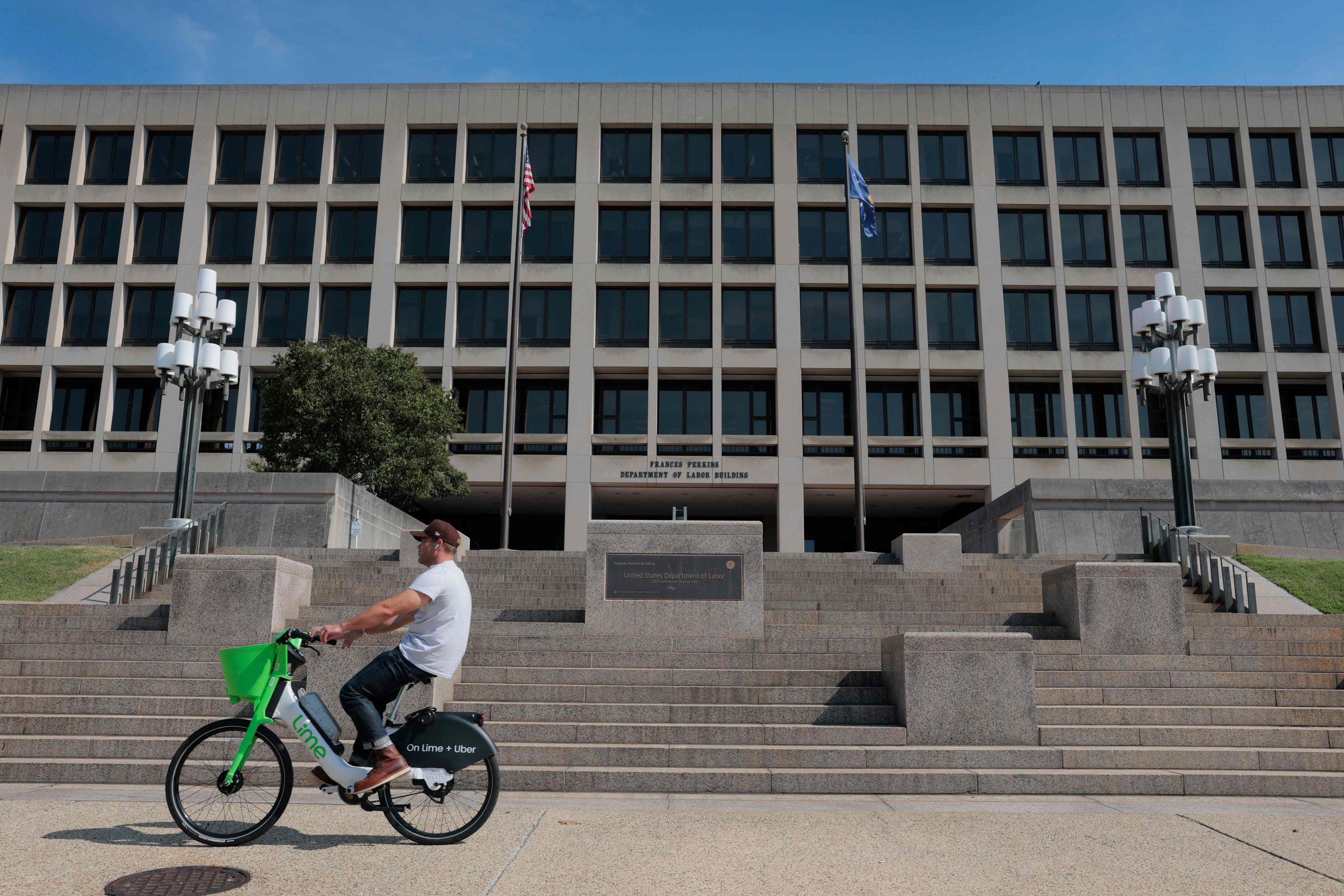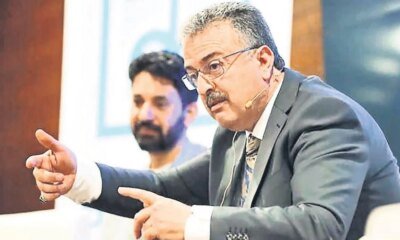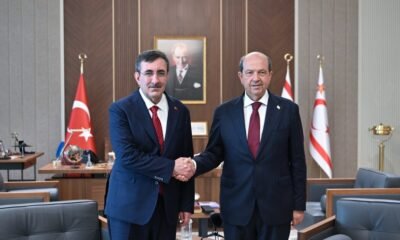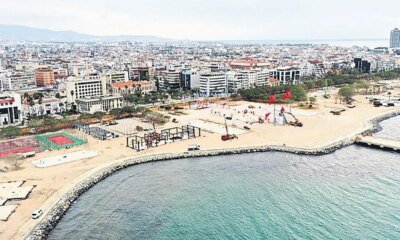Economy
Australian state aims to write into law rights on work from home
The premier of the Australian state of Victoria conveyed on Saturday plans to enshrine working from home in law, arguing it should be “a right, not a request.”
Under Jacinta Allan’s plan, workers would be entitled to work from home at least two days a week, if their job allows it.
“We’re doing that because we know what the evidence tells us – workers are more productive, it saves time for families, it saves money for families,” Allan said, launching the proposed policy at the Labor Party’s state conference.
“This change will mean that any worker who can reasonably do their job from home has the right to do so for at least two days a week.”
Allan said the policy would now be put out for consultation with workers, employers, and unions.
She said it was important to “get the details of this important change right.”
Allan said the move could save the average worker $110 a week, cut congestion on roads, and keep more women in the workforce.
During national elections in May, the opposition Liberal-National coalition’s plan to eliminate remote work was partly blamed for its poor performance.
Victoria’s opposition leader, Brad Battin, said that remote work arrangements had been valuable and that he supported measures that promote better work-life balance.
The measure is likely to be introduced in the state parliament next year.
Economy
‘Türkiye-Syria partnership bound by destiny, shared future’
Syrian Economy and Industry Minister Nidal al-Shaar said Tuesday that Türkiye and Syria are “bound by destiny” and share “a common future” during a meeting.
The Türkiye-Syria roundtable meeting in Ankara was also attended by Turkish Trade Minister Ömer Bolat and Rifat Hisarcıklıoğlu, the president of Türkiye’s Union of Chambers and Commodity Exchanges.
Al-Shaar said Türkiye became “one of the largest economies worldwide in two decades,” and the relations between Ankara and Damascus will continue based on “mutual respect and sincerity.”
The minister said that “no country other than Türkiye and Syria” has done as much for each other, emphasizing that the continued partnership “has to be established in every area,” extending it to cultural, social, economic, industrial, and production areas.
“The experience Türkiye has is one that we can call a miracle,” he said. “That is not easy.”
Al-Shaar said the partnership will start with small and medium-sized enterprises, and then it will move on to larger projects. “We placed trust in the Turkish economy and the Turkish business community, especially in the field of investments,” he noted.
He mentioned that Türkiye will establish production plants in Syria and export industrial goods, while the investments from Türkiye will drive more production.
Al-Shaar highlighted that the 15-year break in relations between Türkiye and Syria during the civil war will resume with the collective effort of rebuilding the country. “The Türkiye-Syria partnership is certain, and it is guided by destiny: this is why we will be together,” he said.
Ankara, which supported opposition forces in Syria throughout the 13-year civil war that ended in December with the ousting of longtime dictator Bashar Assad, has now become one of the new government’s main foreign allies while positioning itself to be a major player in the country’s reconstruction.
Bolat said Tuesday that Turkish banks are preparing to launch operations in Syria in the near future.
Economy
Argentina’s Milei vetoes pension, disability spending hikes
Argentina’s libertarian President Javier Milei vetoed on Monday an attempt to hike spending on pensions in the country and a law expanding protections for people with disabilities, saying the legislation would have undermined his flagship pledge to eliminate the nation’s chronic fiscal deficit before October’s midterm elections.
In publishing the veto decisions, Milei’s administration said that Congress last month passed the spending bills – meant to more fully compensate retirees for inflation and offer more financial benefits for people with disabilities – “without determining the source of the funds.”
It said the bills “contradicted (Milei’s) popular mandate” to bring down inflation.
Since coming to power in late 2023, Milei has vetoed all efforts to boost public spending, often wielding the slogan “there is no money” against people’s demands that he restore subsidies. The government projects that the additional expenditures, including a 7.2% pension increase, will amount to about 0.9% of gross domestic product (GDP) this year and 1.68% next year.
“This president prefers to tell an uncomfortable truth rather than repeat comfortable lies: There is no money,” the government said. Spinning off the slogan of his ally, U.S. President Donald Trump, it added: “The only way to make Argentina great again is with effort and honesty, not the same old recipes.”
Last year, Milei racked up Argentina’s first annual fiscal surplus in 14 years by making painful cuts to social spending and public works. The austerity measures helped drive down Argentina’s monthly inflation rate to below 2% in June for the first time in five years, compared to more than 25% when Milei entered office in December 2023.
But the fiscal shock program has also deepened economic misery for many Argentines: Unemployment has climbed, wages adjusted for inflation have declined, and prices are still up 40% year-on-year.
Congress can still overturn these vetoes with a two-thirds majority in both chambers, a challenge for Milei’s libertarian party, which holds only a small minority of seats.
Milei, whose relationship with lawmakers has been tense ever since he took office, last year managed to win enough votes from his party’s closest ally, the conservative PRO bloc, to prevent the pension increases.
Milei is looking to Argentina’s crucial midterm elections in October to boost his party’s representation as he seeks to continue his fiscal balance drive and draw more foreign investment.
The elections are widely seen as a referendum on his two years in office.
Retirees have been at the forefront of protests against Milei’s government. Every Wednesday now for months, dozens of older Argentines struggling to scrape by on pensions of just $400 a month have faced off against security forces armed with tear gas and water cannons.
Economy
Rejecting jobs report, Trump doubles down on discrediting unfavorable data
When the coronavirus surged during President Donald Trump’s first term, he sought to downplay the outbreak by urging fewer tests. After losing the 2020 election, he claimed – without evidence – that the vote was rigged.
And on Friday, faced with a weak July jobs report, Trump followed a familiar pattern: He dismissed the report as “phony” and fired the official in charge of the data.
Trump has a go-to playbook if the numbers reveal uncomfortable realities, and that’s to discredit or conceal the figures and to attack the messenger – all of which can hurt the president’s efforts to convince the world that America is getting stronger.
“Our democratic system and the strength of our private economy depend on the honest flow of information about our economy, our government and our society,” said Douglas Elmendorf, a Harvard University professor who was formerly director of the Congressional Budget Office. “The Trump administration is trying to suppress honest analysis.”
The president’s strategy carries significant risks for his own administration and a broader economy that depends on politics-free data.
His denouncements threaten to lower trust in government and erode public accountability, and any manipulation of federal data could result in policy choices made on faulty numbers, causing larger problems for both the president and the country.
The White House disputes any claims that Trump wants to hide numbers that undermine his preferred narratives.
It emphasized that Goldman Sachs found that the two-month revisions on the jobs report were the largest since 1968, outside of a recession, and that should be a source of concern regarding the integrity of the data. Trump’s aides say their fundamental focus is ensuring that any data gives an accurate view of reality.
Not first time
Trump has a long history of dismissing data when it reflects poorly on him and extolling or even fabricating more favorable numbers, a pattern that includes his net worth, his family business, election results and government figures:
Judge Arthur Engoron ruled in a lawsuit brought by the state of New York that Trump and his company deceived banks, insurers and others by massively overvaluing his assets and exaggerating his net worth on paperwork used in making deals and securing loans. Trump has claimed that the 2016 and 2020 presidential elections were each rigged. Trump won the 2016 presidential election by clinching the Electoral College, but he lost the popular vote to Hillary Clinton, a sore spot that led him to falsely claim that millions of immigrants living in the country illegally had cast ballots. He lost the 2020 election to Joe Biden but falsely claimed he had won it, despite multiple lawsuits failing to prove his case. In 2019, as Hurricane Dorian neared the East Coast, Trump warned Alabama that the storm was coming its way. Forecasters pushed back, saying Alabama was not at risk. Trump later displayed a map in the Oval Office that had been altered with a black Sharpie – his signature pen – to include Alabama in the potential path of the storm. Trump’s administration has stopped posting reports on climate change, canceled studies on vaccine access and removed data on gender identity from government sites. As pandemic deaths mounted, Trump suggested that there should be less testing. “When you do testing to that extent, you’re going to find more people,” Trump said at a June 2020 rally in Oklahoma. “You’re going to find more cases. So I said to my people, ‘Slow the testing down, please.'”
While Trump’s actions have drawn outcry from economists, scientists and public interest groups, Elmendorf noted that Trump’s actions regarding economic data could be tempered by Congress, which could put limits on the president by whom he chooses to lead federal agencies, for example.
“Outside observers can only do so much,” Elmendorf said. “The power to push back against the president rests with the Congress. They have not exercised that power, but they could.”
Trump wants ‘own people’ in place
Kevin Hassett, director of the White House National Economic Council, took aim at the size of the downward revisions in the jobs report (a combined 258,000 reduction in May and June) to suggest that the report had credibility issues.
He said Trump is focused on getting dependable numbers, despite the president linking the issue to politics by claiming the revisions were meant to make Republicans look bad.
“The president wants his own people there so that when we see the numbers, they’re more transparent and more reliable,” Hassett said Sunday on NBC News.

Jed Kolko, a senior fellow at the Peterson Institute for International Economics who oversaw the Census Bureau and Bureau of Economic Analysis during the Biden administration, stressed that revisions to the jobs data are standard. That’s because the numbers are published monthly, but not all surveys used are returned quickly enough to be in the initial publishing of the jobs report.
“Revisions solve the tension between timeliness and accuracy,” Kolko said. “We want timely data because policymakers and businesses and investors need to make decisions with the best data that’s available, but we also want accuracy.”
Kolko stressed the importance of ensuring that federal statistics are trustworthy, not just for government policymakers but for the companies trying to gauge the overall direction of the economy when making hiring and investment choices.
“Businesses are less likely to make investments if they can’t trust data about how the economy is doing,” he said.
Not every part of the jobs report was deemed suspect by the Trump administration.
Before Trump ordered the firing of the Bureau of Labor Statistics commissioner, Erika McEntarfer, the White House rapid response social media account reposted a statement by Vice President JD Vance noting that native-born citizens were getting jobs and immigrants were not, drawing from data in the household tables in the jobs report.
Labor Secretary Lori Chavez-DeRemer also trumpeted the findings on native-born citizens, noting on Fox Business Network’s “Varney & Co.” that they are accounting “for all of the job growth, and that’s key.”
During his first run for the presidency, Trump criticized the economic data as being fake, only to fully embrace the positive numbers shortly after he first entered the White House in 2017.
Transparency is value
The challenge of reliable data goes beyond economic figures to basic information on climate change and scientific research.
In July, taxpayer-funded reports on the problems climate change is creating for America and its population disappeared from government websites. The White House initially said NASA would post the reports in compliance with a 1990 law, but the agency later said it would not because any legal obligations were already met by having reports submitted to Congress.
The White House maintains that it has operated with complete openness, posting a picture of Trump on Monday on social media with the caption, “The Most Transparent President in History.”
In the picture, Trump had his back to the camera and was covered in shadows, visibly blocking out most of the light in front of him.
Economy
Türkiye says its banks set to launch operations in Syria
Turkish banks are preparing to launch operations in Syria in the near future, Trade Minister Ömer Bolat said Tuesday, as Türkiye adds momentum to efforts to help its neighbor recover its war-torn economy.
Bolat also emphasized the growing pace in talks aimed at involving Turkish contractors in Syria’s rebuilding process.
He was speaking alongside Syrian Economy and Industry Minister Mohammad Nidal al-Shaar at the signing ceremony of the founding protocol of the Türkiye-Syria Joint Economic and Trade Committee (JETCO) in Ankara.
Ankara, which supported opposition forces in Syria throughout the 13-year civil war that ended in December with the ousting of longtime dictator Bashar Assad, has now become one of the new government’s main foreign allies while positioning itself to be a major player in the country’s reconstruction.
“Turkish and Syrian businesspeople are coming together today and tomorrow under the coordination of TOBB and DEIK,” Bolat said, referring to the Union of Chambers and Commodity Exchanges of Türkiye and the Foreign Economic Relations Board.
“The Türkiye-Syria Business Council is being reestablished, and its founding agreement will be signed tomorrow between Turkish and Syrian institutions at DEIK,” he noted.
Bolat said preparations are underway for Turkish financial institutions to enter the Syrian market. “Our banks are also preparing to begin operations in Syria in the short term,” he added.
His announcement comes days after representatives from Türkiye’s Treasury and banking sector reportedly met with Syrian officials in Damascus to explore potential cooperation in banking, insurance and public finance.
Before the Syrian civil war, Türkiye’s largest lender, Ziraat Bank, had been in talks to establish a bank in Syria with a local partner in 2010, but those plans were suspended with the onset of the conflict. Currently, no Turkish banks operate in Syria.
Following the ousting of Assad, Ziraat Bank General Manager Alpaslan Çakar had told Reuters that the bank would be ready to take on responsibility in Syria if conditions allowed.
Broader reconstruction-focused talks are ongoing between Türkiye and the Syrian interim government, particularly in sectors such as energy and infrastructure, as part of efforts to stabilize and rebuild the country.
“Turkish entrepreneurs led by contractors are eager to play an active role in the reconstruction of Syria, including infrastructure, superstructure and social housing,” Bolat said. “Discussions between business communities and contractors from both countries are accelerating.”
Speaking at a separate meeting following the ceremony, Bolat said they were taking modernization steps to facilitate border crossings with Syria, accelerate trade and enhance security.
He said Türkiye is ready to make the strongest contributions to Syria’s recovery, expressing belief that Turkish companies, with their expertise and experience in manufacturing, infrastructure, banking and construction, will take the lead in Syria.
“Our firms are ready to undertake Syria’s transportation infrastructure and rebuilding projects, especially those involving public-private partnerships and build-operate-transfer models,” Bolat said.
The JETCO meetings, which Bolat said will now be held at regular intervals, will bring together the business communities of both countries on an institutional platform. He also emphasized that they are ready to begin negotiations to establish a comprehensive economic partnership agreement between the two nations.
Regarding his meeting with al-Shaar, Bolat noted that they discussed customs regime practices and transportation activities in detail.
“From now on, our trucks will no longer need to transfer cargo or swap trailers at the Syrian border. In the coming period, Aleppo will become a strong logistics hub. Syria’s transportation corridors will be reactivated. We are entering a new era where transit transport to Gulf countries will resume, and both our countries will benefit from emerging areas of cooperation in trade,” he said.
“We approach our customs collaboration with the same strategic vision, taking modernization steps that ease border crossings, speed up trade and enhance security, and we are improving the customs gates opening to Syria.”
Bolat also drew attention to the importance of the energy-related step and noted Saturday’s launch of gas exports to Syria.
Deliveries of Azerbaijan’s gas through Türkiye are expected to reach around 6 million cubic metres (mcm) per day. The current delivery plan foresees exports of 1.2 billion cubic meters annually. Türkiye said there was potential to supply up to 2 bcm per year in the first phase.
The gas will be used to restart power plants in Syria with a combined capacity of 1,200 megawatts.
The Türkiye-Syria Natural Gas Pipeline will meet the electricity needs of 5 million households, said Bolat, stressing the will to further develop cooperation with joint energy and power plant projects in the period ahead.
Economy
South Africa names Türkiye strategic market amid US tariff hike
South Africa has positioned Türkiye among its strategically prioritized target markets in response to U.S. tariffs that are due to take effect on Aug. 8, a report indicated on Monday.
The country, which had a rough start to relations with the new Trump administration, faces a 30% levy, the highest rate among sub-Saharan African countries.
Accordingly, its government is said to have launched a comprehensive strategy to develop relations with alternative trade partners to counter the tariffs.
Anadolu Agency (AA), citing a statement from the Ministry of International Relations and Cooperation, said it described the new 30% customs tariff, applied despite South Africa’s only 0.25% share in U.S. imports, as an “incomprehensible” decision that damages mutual relations.
However, it also noted that South Africa will continue contacts with the U.S. to reach an agreement benefiting the interests of both countries.
“Instead of relationships that deprive our country of the capacity to utilize its mineral wealth and imitate the colonial-era coercive trade relations, we aim to make agreements that promote value-added production and industrialization,” it added.
“Our foremost priority is protecting our export industries. We will continue to engage the U.S. in an attempt to preserve market access for our products,” Reuters quoted President Cyril Ramaphosa as saying separately in a newsletter on Monday.
South Africa is a major producer of precious metals, including gold and platinum, which it exports to other markets, in addition to other items such as mineral fuels, vehicles and plastics.
Moreover, the statement by the ministry noted that the new tariff regime may directly impact South Africa’s economy, making it necessary to turn to alternative markets.
It emphasized that this situation also presents an opportunity to develop new partnerships in markets that have not been sufficiently explored so far.
“In this context, along with the Association of Southeast Asian Nations (ASEAN) countries, Türkiye is among the strategically prioritized target markets,” the statement said.
The statement also noted that significant progress has already been made in opening up to markets such as the European Union, China, Thailand, Japan, the United Arab Emirates (UAE) and Saudi Arabia.
According to official data, Türkiye’s bilateral trade volume with South Africa, its largest trading partner in sub-Saharan Africa, reached approximately $2 billion in 2024.
About $700 million of this trade was Turkish exports, and $1.3 billion was imports from South Africa.
Economy
Aramco profit falls again as slump in oil prices hits revenues
Oil giant Saudi Aramco announced its 10th consecutive drop in quarterly profits on Tuesday as a slump in prices hit revenues, adding more pressure on the key driver of the Saudi economy.
Second quarter profits declined 22% year-over-year to 85 billion riyals ($22.67 billion), extending a decline that has been ongoing since late 2022.
“The decrease in revenue was mainly due to lower crude oil prices and lower refined and chemical products prices,” Aramco said in its quarterly report.
Aramco’s falling revenues come as Saudi Arabia pursues a costly revamp aimed at reducing its reliance on oil and pivoting toward tourism and business.
Crown Prince Mohammad bin Salman’s Vision 2030 project includes flashy resorts, sprawling entertainment complexes and NEOM, a futuristic $500 billion new city in the desert.
Aramco was trading at 23.97 riyals on Tuesday, 12% below the 27.35 riyals price of its secondary share offering last year.
Since a high point of nearly $2.4 trillion in 2022, when oil prices soared following Russia’s invasion of Ukraine, Aramco has lost more than $800 billion in market value.
Oil prices, currently around $70 a barrel, have remained low despite tensions roiling the Middle East, including the short-lived Israel-Iran war in June.
However, Aramco president and CEO Amin H. Nasser remained optimistic, predicting higher demand in the rest of the year.
“Market fundamentals remain strong and we anticipate oil demand in the second half of 2025 to be more than two million barrels per day (bpd) higher than the first half,” he said in the report.
On Sunday, Saudi Arabia, Russia and six other key members of the OPEC+ alliance announced a production hike of 547,000 barrels per day as they unwind cuts of 2.2 million bpd that were designed to prop up prices.
‘More downwards than upwards’
Last month, Saudi Arabia’s Jadwa Investment forecast a widening of the budget deficit to 4.3% of gross domestic product (GDP) this year. Oil revenues provided 62% of the budget last year.
Industry analysts widely expected Aramco’s latest drop in profits.
“Oil market forces are more downwards than upwards in the first half of 2025, due to OPEC+ policy shifts and economic uncertainty stemming from the U.S. trade war,” Abu Dhabi-based Ibrahim Abdul Mohsen told Agence France-Presse (AFP).
“This has impacted the profit margins of oil companies, including Aramco.”
But he added: “Saudi Arabia has strong reserves capable of defending financial stability and supporting development projects in the short term.”
Government-owned Aramco was listed on the Saudi exchange in the world’s biggest initial public offering (IPO) in 2019, selling 1.7% of its shares at $29.4 billion.
A secondary offering of 0.64% of its issued shares raised a further $11.2 billion in June last year.
Aramco has also transferred a 16% stake to the Public Investment Fund (PIF), the Saudi wealth vehicle that is driving much of Vision 2030.
-

 Politics2 days ago
Politics2 days ago‘Israel intentionally stalling cease-fire talks to weaken resistance’
-

 Daily Agenda2 days ago
Daily Agenda2 days agoNew “Sea Protection Areas” added to Türkiye’s national maritime planning map
-

 Daily Agenda2 days ago
Daily Agenda2 days agoAK Party Political Academy became a turning point in Turkish politics
-

 Sports2 days ago
Sports2 days agoLuka Doncic signs $165M deal to extend Lakers stay by 3 years
-

 Daily Agenda2 days ago
Daily Agenda2 days ago102 immigrant smugglers and 393 irregular immigrants were caught
-

 Politics1 day ago
Politics1 day agoTürkiye, TRNC deepen cooperation in security, digital governance
-

 Daily Agenda2 days ago
Daily Agenda2 days agoTürkiye, next to the Syrian brothers! Historical Number on Volunteer Return: More than 1 million Syrian returned
-

 Daily Agenda3 days ago
Daily Agenda3 days agoHoliday Gift to Hataylılar: İskenderun Coast Opens on 29 October




